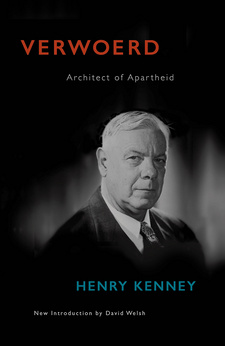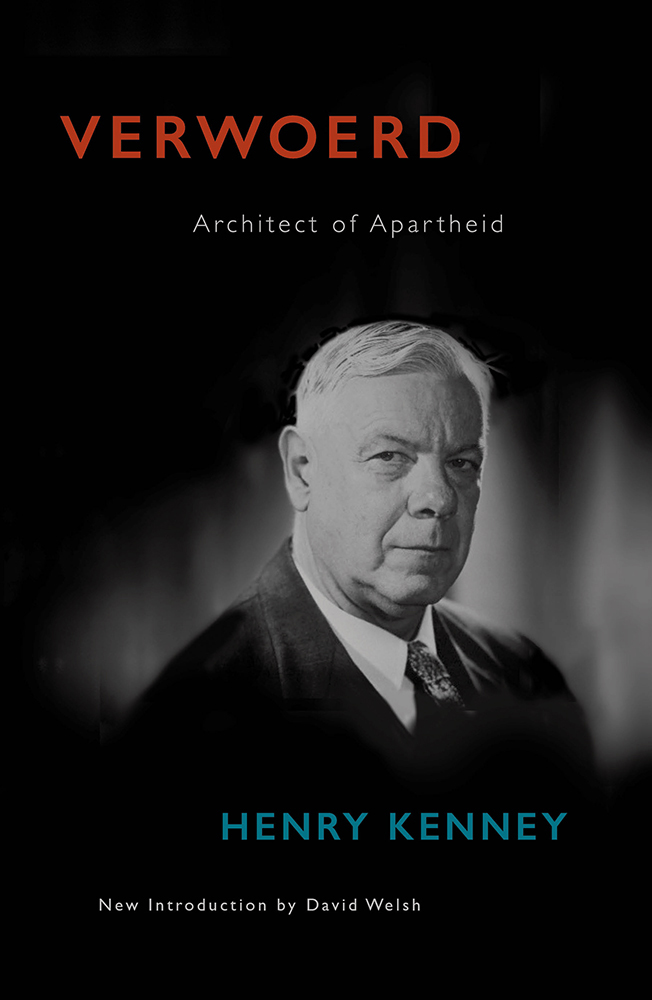Verwoerd: Architect of Apartheid, by Henry Kenney

Verwoerd: Architect of Apartheid, by Henry Kenney. Jonathan Ball Publishers SA, Cape Town; Johannesburg; South Africa, 2016. ISBN 9781868427161 / ISBN 978-1-86842-716-1
Henry Kenney's appraisal of Hendrik Verwoerd, originally published in 1980, has stood the test of time as one of the best books written about a South African politician. Verwoerd: Architect of Apartheid is a far better book than the hagiographic two-volume biography by G. D. Scholtz or the tendentious account by Alex Hepple.
The merit of Kenney's book is its balance and its accuracy. To this writer's knowledge, no reviewer or other critic has been able to find a serious fault or omission. The republication 50 years after Verwoerd's death comes at an appropriate time, enabling the reader to realise what apartheid meant, and how far South Africa has since changed. In his lifetime Verwoerd enjoyed a large cult following. By 2016 their numbers have dwindled into insignificance. Rather than "solving" the racial issue, Verwoerd compounded it, leaving later generations with the massive problem of repairing the damage. The subtitle Architect of Apartheid needs qualification. Some years before Verwoerd's entry into politics, the design of apartheid had been sketched, and principles had been laid down. Verwoerd's role was more that of master-builder than architect. This is not to deny that Verwoerd added distinct touches to the design. Dr Nico Smith, a Dutch Reformed Church clergyman, quoted Verwoerd as saying that he wanted to implant the concept of apartheid so deeply into society that no future government would be able to undo what had been done.1 Smith did not provide details of when and where he heard this, but it may well have been at a meeting of the Afrikaner Broederbond, of which both he and Verwoerd were members. (Smith later resigned from the Broederbond and became a doughty opponent of apartheid.) Whether Verwoerd's boast, as reported by Smith, will be realised, if only in part, remains to be seen. Hendrik Frensch Verwoerd was born in the Netherlands in September 1901.2 His parents were strong supporters of the Boer cause in the Anglo-Boer War, so much so that they decided to emigrate to South Africa, arriving in November 1903. The young Verwoerd grew up in a household that was fervently pro-Afrikaner. Verwoerd senior, a building contractor by profession, was a devout Christian, eager to undertake missionary work for the Nederduitse Gereformeerde Kerk (N.G.K.). After some years in Cape Town, whose white population was predominantly English-speaking, the family moved to Rhodesia in 1914. Hendrik, who had spent over a year at Wynberg Boys' High School, was now enrolled at Milton High School, near Bulawayo. He shone as a pupil - and even played the quintessentially English game of cricket! But he disliked the imperial atmosphere of the school, and avoided singing the (British) national anthem. His stellar performance resulted in the headmaster's offering him a bursary, which he declined, since the family had been called to the Orange Free State by the Church. The headmaster took a dim view of this, deeming the Free Staters to be "those rebels" and chasing Verwoerd out of his office. One asset derived from his years in English-medium schools was an ability to speak fluent English. In the Orange Free State, the Verwoerds found themselves in a thoroughly Afrikaans environment, and Hendrik attended an Afrikaans school in which he flourished, passing the matriculation examination with the top marks in the province. Verwoerd's intention was to study Theology at Stellenbosch University, where he enrolled in 1919. His progress was rapid: a BA degree in 1921 and an MA in 1922, both cum laude. By 1924 he had completed his doctoral dissertation entitled "The Blunting of the Emotions" (translation). By this time, his intellectual interest had switched to Psychology. Nevertheless he had applied to the N.G.K. authorities to enter the Theological Seminary. [...]
This is an excertpt from the 2016 edition of Verwoerd: Architect of Apartheid, by Henry Kenney.
Title: Verwoerd
Subtitle: Architect of Apartheid
Author: Henry Kenney
Genre: Biography, History
Publisher: Jonathan Ball Publishers SA
Cape Town; Johannesburg; South Africa, 2016
ISBN 9781868427161 / ISBN 978-1-86842-716-1
Softcover, 15 x 23 cm, 320 pages, several photos
Kenney, Henry im Namibiana-Buchangebot
Verwoerd: Architect of Apartheid
Verwoerd: Architect of Apartheid, interprets Hendrik Verwoerd in the context of the Prime Minister’s times and his own present.

